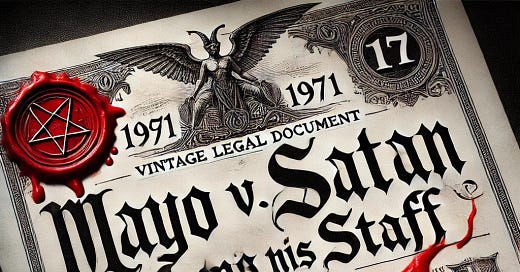The Devil's in the Details: A Lawsuit Against Satan
In 1971, the United States District Court for the Western District of Pennsylvania faced an unusual jurisdictional challenge: how exactly does one serve papers to Satan? This wasn't a theoretical question - Gerald Mayo had just filed suit against the Prince of Darkness himself, claiming violations of his constitutional rights.
Deal with the Devil
Mayo, filing in forma pauperis (a request to proceed without paying court fees due to inability to pay), alleged that Satan had caused him significant hardship, placed deliberate obstacles in his path, and was "the cause of [his] downfall." The court noted the specific allegations in Mayo's complaint: "Plaintiff alleges that Satan has on numerous occasions caused him misery and unwarranted threats, against the will of plaintiff, that Satan has placed deliberate obstacles in his path and has caused plaintiff's downfall."
Sympathy for the Devil
U.S. District Court Judge Gerald J. Weber began by acknowledging that the plaintiff had properly filed his complaint under the Civil Rights Act, noting dryly that "Plaintiff alleges that by reason of these acts Satan has deprived him of his constitutional rights."
The court first had to tackle the thorny issue of jurisdiction. While no one could definitively prove whether the Father of Lies maintained a residence in Pennsylvania (though his apparent fondness for the Philadelphia Eagles suggests at least a part-time presence), there remained serious questions about whether the Western District of Pennsylvania could claim authority over the Prince of Darkness.
The court's analysis of jurisdiction is particularly memorable:
"Even if the complaint were to be amended to allege citizenship of the defendant in some jurisdiction amenable to service of process, there would remain the question of whether the defendant would appear voluntarily to defend the suit... If such appearance were not forthcoming, there would be a serious question of the feasibility of service of process by the United States Marshal."
Running with the Devil
The judge's most inspired moment came when citing legal precedent. Unable to find Satan as a defendant in any official court reports, he turned to "The Devil and Daniel Webster," Stephen Vincent Benét's 1936 short story. In this American classic, Webster defends a New Hampshire farmer who has sold his soul to Satan, defeating him in a trial by jury. The judge noted that the story, "although not officially reported," demonstrated that "Satan has been a personal defendant in a close factual situation to the case at bar."
However, as Weber pointed out with impeccable legal reasoning, there was a crucial distinction. In Webster's case, "the Devil was actively involved in the proceedings and actually appeared in person to defend his rights." Furthermore, in that case, Satan was actually the plaintiff in a mortgage foreclosure, leading to what the judge called "this important procedural distinction."
Highway to Hell
Judge Weber concluded that given these "difficulties of effectuating service of process... and the uncertainty of whether defendant would appear," the court had no choice but to deny Mayo's petition to proceed in forma pauperis. The case was effectively dismissed not because it was frivolous, but because of the practical impossibility of serving legal papers to the Lord of the Underworld.
The case lives on as both a masterpiece of judicial wit and a reminder that even when faced with the absurd, American courts must proceed with proper legal analysis. The court's meticulous consideration of how one might serve legal papers joins other notable attempts to bring supernatural defendants into American courts, including several attempts to sue God (all dismissed for similar service of process issues) and various lawsuits against natural phenomena.
Anyways… I heard a passing reference to this lawsuit on a podcast about the Supreme Court and spent the next 2 hours on a deep-dive, so you’re welcome?
Stay tuned.




